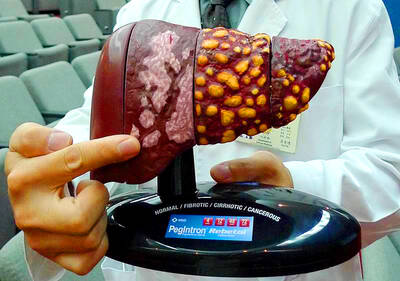Taiwan expressed its sadness yesterday over the death of Chinese democracy activist Fang Lizhi (方勵之), who died on Friday last week in Tucson, Arizona, at the age of 76 after years of exile in the US.
“Every member of the Taiwanese public shares the same feeling of sorrow about his passing,” Mainland Affairs Council Deputy Minister Liu Te-shun (劉德勳) said in response to questions at a regular news briefing.
Liu said the death of Fang, a liberal academic who was an inspiration for the 1989 Tiananmen Square pro-democracy protesters, was a loss for the development of China’s human rights and civil rights.
The Taiwanese government has long made clear its stance on the development of democracy in China and that democracy is a universal value, Liu said.
“Any responsible government must face its people with this [democratic] way of thinking,” he added.
Fang, an astrophysicist and former University of Science and Technology of China vice president, was expelled from the Chinese Communist Party and removed from his post at the university in 1987 because of a statement advocating democracy.
During the 1989 protests in Beijing, Fang and his wife were granted asylum at the US embassy, where they stayed for a year before being flown to Britain on a US aircraft. Six months later, they moved to the US, where Fang was later employed as a physics professor at the University of Arizona.

The Taipei Summer Festival is to begin tomorrow at Dadaocheng Wharf (大稻埕), featuring four themed firework shows and five live music performances throughout the month, the Taipei Department of Information and Tourism said today. The festival in the city’s Datong District (大同) is to run until Aug. 30, holding firework displays on Wednesdays and the final Saturday of the event. The first show is scheduled for tomorrow, followed by Aug. 13, 20 and 30. To celebrate the 30th anniversary of Disney Pixar's movie Toy Story, the festival has partnered with Walt Disney Co (Taiwan) to host a special themed area on

Aftershocks from a magnitude 6.2 earthquake that struck off Yilan County at 3:45pm yesterday could reach a magnitude of 5 to 5.5, the Central Weather Administration (CWA) said. Seismological Center technical officer Chiu Chun-ta (邱俊達) told a news conference that the epicenter of the temblor was more than 100km from Taiwan. Although predicted to measure between magnitude 5 and 5.5, the aftershocks would reach an intensity of 1 on Taiwan’s 7-tier scale, which gauges the actual effect of an earthquake, he said. The earthquake lasted longer in Taipei because the city is in a basin, he said. The quake’s epicenter was about 128.9km east-southeast

BE CAREFUL: The virus rarely causes severe illness or death, but newborns, older people and those with medical conditions are at risk of more severe illness As more than 7,000 cases of chikungunya fever have been reported in China’s Guangdong Province this year, including 2,892 new cases last week, the Centers for Disease Control (CDC) yesterday said it is monitoring the situation and considering raising the travel notice level, which might be announced today. The CDC issued a level 1 travel notice, or “watch,” for Guangdong Province on July 22, citing an outbreak in Foshan, a manufacturing hub in the south of the province, that was reported early last month. Between July 27 and Saturday, the province reported 2,892 new cases of chikungunya, reaching a total of 7,716

STAY VIGILANT: People should reduce the risk of chronic liver inflammation by avoiding excessive alcohol consumption, smoking and eating pickled foods, the physician said A doctor last week urged people to look for five key warning signs of acute liver failure after popular producer-turned-entertainer Shen Yu-lin (沈玉琳) was reportedly admitted to an intensive care unit for fulminant hepatitis. Fulminant hepatitis is the rapid and massive death of liver cells, impairing the organ’s detoxification, metabolic, protein synthesis and bile production functions, which if left untreated has a mortality rate as high as 80 percent, according to the Web site of Advancing Clinical Treatment of Liver Disease, an international organization focused on liver disease prevention and treatment. People with hepatitis B or C are at higher risk of